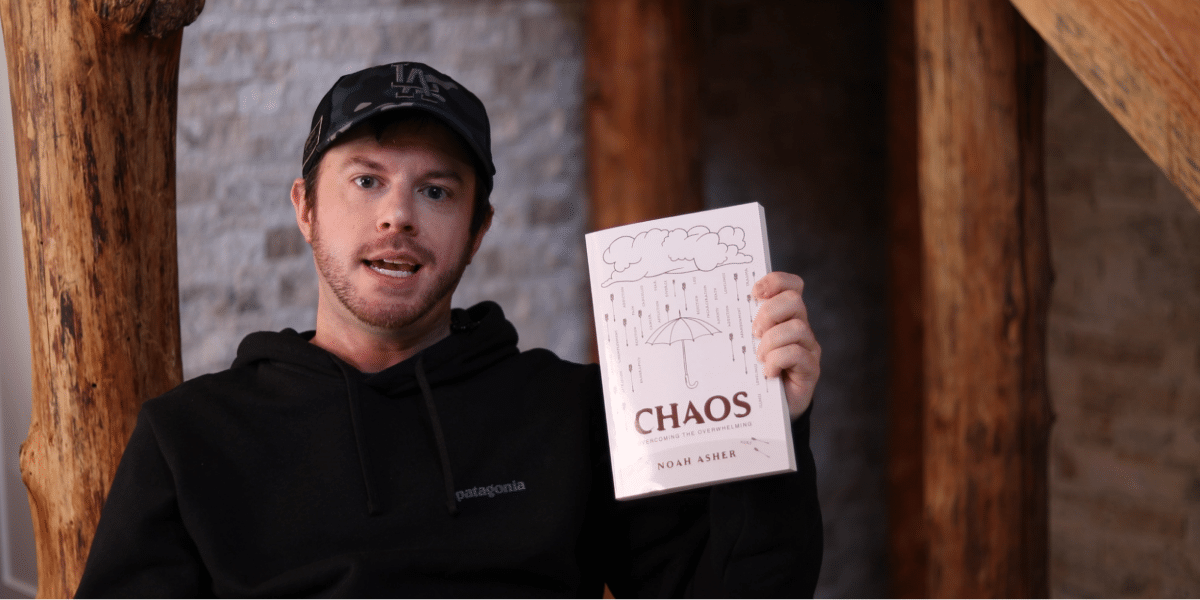Incarceration can be chaotic. So can the rebuilding that follows. Noah Asher has personally experienced both. His journey is not just one of personal triumph but also serves as a rallying cry for compassion and systemic change. Asher’s latest Christian nonfiction book, “CHAOS: Overcoming the Overwhelming,” represents more than his own narrative of moving from incarceration to becoming an inspirational figure; it stands as a pivotal piece in his larger mission advocating for re-entry reform. Through the intertwining of his personal redemption story with a broader vision, Asher seeks to alter the destinies of individuals affected by the prison system, steering them toward lives marked by purpose and optimism.
Asher’s tale is riveting, shaped by challenges that have led him to deep reflections on faith, resilience, and the transformative power of second opportunities. His literary work comes in the wake of personal encounters with imprisonment and loss—experiences enough to shatter many. Yet, choosing a path divergent from despair, Asher embarked on a journey of healing and extending a helping hand to others trapped in cycles of despondency. “CHAOS: Overcoming the Overwhelming” transcends its status as mere literature; it becomes a vital lifeline for those navigating through life’s stormy waters post-incarceration.
The essence of re-entry programs in diminishing recidivism rates within America propels Asher’s advocacy efforts. Such initiatives are essential for ensuring that individuals exiting prison can reintegrate into society successfully—achieving employment, securing housing, and reconstructing their lives without reverting back to criminal activities. Despite their critical importance, these programs frequently suffer from inadequate support and resources necessary for their effective execution. It is within this void that Noah Asher steps forward with both words and deeds.
By channeling all proceeds from “CHAOS” towards distributing copies to prison libraries and rehabilitation centers, Asher demonstrates his dedication to effectuating real change through literary means. This initiative ensures that his message of hope and guidance reaches those most in need—providing solace and direction within confines where hope is often in short supply.
Beyond financial contributions, Asher actively lobbies for enhanced re-entry schemes across the nation. The prevalent high recidivism rate underscores a systemic failure—one that demands attention if true rehabilitation is ever to be realized. Embodying this conviction, Asher has implored U.S. Senators to collaborate beyond partisan lines in addressing this crisis head-on. His call encapsulates a vision for a society where ex-inmates are afforded genuine chances at rebuilding their lives post-release: “If we want to see less recidivism, we must work on rehabilitation. I’m calling on US Senators to reach across the aisle to bring a solution to this national epidemic.”
Through social media outlets like Instagram (@TheNoahAsher), he disseminates insights from his book alongside inspiring narratives aimed at destigmatizing incarceration while emphasizing every individual’s potential for transformation and redemption. These platforms enable him to reach an expansive audience, spreading hope while garnering support for re-entry reform efforts. His quick rise to “influencer status” is proof that people want hope, help,and humor—this is what Asher provides in his book and in his engagement.
Rehabilitation extends beyond merely deterring former inmates from committing new offenses; it encompasses restoring dignity and opening avenues for substantial contributions back into society. Successful reintegration not only benefits individuals but enriches communities at large—lowering crime rates while nurturing environments conducive to second chances.
Noah Asher and his team’s endeavors exemplify how one person’s journey can ignite broad-scale transformation—showcasing an unwavering belief in humanity’s capacity for renewal against formidable odds. As more individuals engage with his work—whether through reading “CHAOS,” following his advocacy online or supporting re-entry initiatives—the closer we inch toward cultivating a society founded on empathy rather than judgment.
In summing up, “CHAOS: Overcoming the Overwhelming” combined with Asher’s passionate advocacy work carves out arenas where discussions on prison reform can thrive—shining light on routes towards redemption while advocating tirelessly for systems better equipped at offering genuine fresh starts post-incarceration. For further details on Noah Asher and his groundbreaking book “CHAOS: Overcoming the Overwhelming,” visit www.thenoahasher.com. All proceeds of his book are used to provide copies inside prison libraries and rehab centers across America.
Published By: Aize Perez








